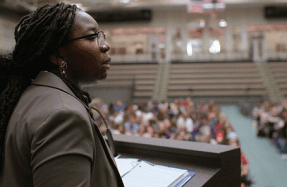Acting Naturally

IF HYBRID DOCUMENTARIES were all the rage in the 2010s, now is the time for hybrid dramas. An emerging trend sees filmmakers cast people as themselves in stories dramatizing their experiences. These films follow a decade in which documentaries increasingly gravitated towards fictional elements while Hollywood doubled down on non-fiction properties. New evolutions in hybrid film employ the power of self-representation to move audiences with the drama of our increasingly fragmented world.
The popularity of hybrid docs, loosely defined as non-fiction works that incorporate elements of dramatization and performance, is reframing the definition of documentary itself. Joshua Oppenheimer’s The Act of Killing (2012) features Indonesian right-wing murderers re-enacting their crimes from the mid-1960s civil annihilation of the Communists after the overthrow of Sukarno. These uber-theatrical performances include musical numbers and Spaghetti western drag shows amid interviews with the criminals. Sarah Polley’s Stories We Tell (2012), meanwhile, incorporates dramatic B-roll within a tapestry of home movies. The collage of archival elements and re-enactments evokes the ways in which memories become fictitious as people re-interpret them over time. The films of Robert Greene—Actress (2012), Kate Plays Christine (2016), and Bisbee ’17 (2018)—contrast conventional elements of documentary and explore the fissures between social roles, media images, and historical records, respectively. Whether it’s Brandy Burre playing herself, Kate Lyn Sheil interpreting ill-fated newscaster Christine Chubbuck, or local workers re-enacting history, Greene’s interplay between documentary and drama finds truth in performance.
Hybrid Docs vs. Hybrid Dramas
These hybrid docs go beyond docu-drama or outright re-enactments. Rather, they incorporate elements of fiction within non-fiction to meditate in these films (see Daniel Glassman’s essay “Oblique Strategies” ( 110), for example), but the interplay between documentary and drama can also underscore power structures that determine what gets recorded by history, how stories are framed, and who tells them, via radical . Hybrid dramas reflect these concerns by inviting people to tell their own stories.
You’re reading a preview, subscribe to read more.
Start your free 30 days





